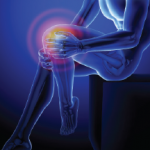These findings suggest a new treatment perspective, she says.3 “Steroid injections are not a pin point, perfect therapy, but we think this treatment could be beneficial in relieving pain for certain patients with OA of the knee who show consistent effusion synovitis.”
As Dr. Macfarlane, Dr. Katz and their research colleagues continue to investigate the role of inflammation in OA, this study confirms the association between effusion synovitis and cartilage damage.
The next logical research question Dr. MacFarlane and her colleagues plan to pursue is if patients with OA who demonstrate more inflammation respond better to corticosteroid injections. She’s also curious to further the research on whether patients with higher synovial fluid white blood cell count respond better to steroid therapy.
Carina Stanton is a freelance science journalist based in Denver.
References
- MacFarlane LA, Yang HY, Collins JE, et al. Effect of baseline and change in effusion-synovitis on cartilage damage over 18 months in patients with osteoarthritis and meniscal tear [abstract]. Arthritis Rheumatol. 2017;69(suppl 10).
- Katz JN, Brophy RH, Chaisson CE, et al. Surgery versus physical therapy for a meniscal tear and osteoarthritis. N Engl J Med. 2013 May 2;368(18):1675–1684. doi: 10.1056/NEJMoa1301408.
- O’Neill TW, Parkes MJ, Maricar N, et al. Synovial tissue volume: A treatment target in knee osteoarthritis (OA). Ann Rheum Dis. 2016 Jan;75(1):84–90. doi: 10.1136/annrheumdis-2014-206927. Epub 2015 Jun 26.

